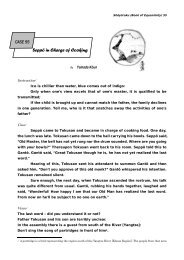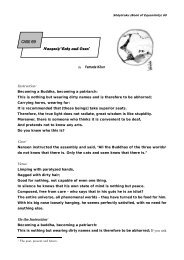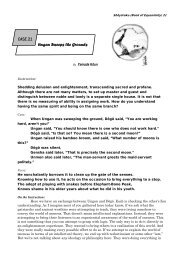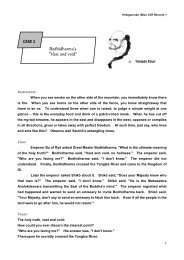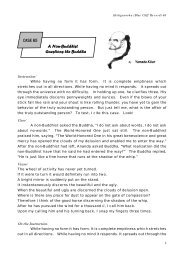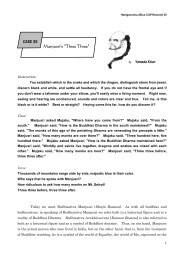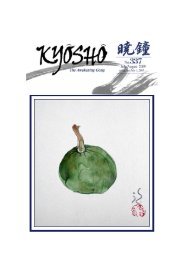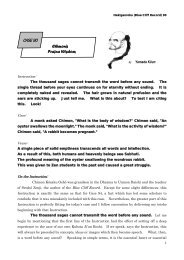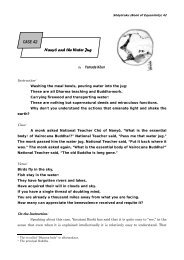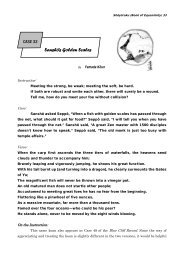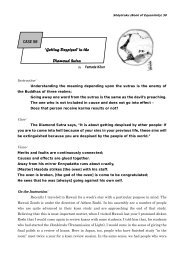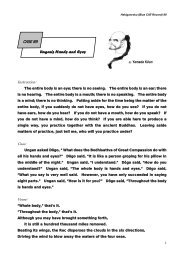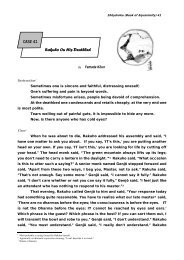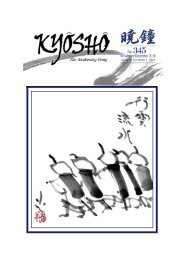Shoyoroku 18
Shoyoroku 18
Shoyoroku 18
- No tags were found...
Create successful ePaper yourself
Turn your PDF publications into a flip-book with our unique Google optimized e-Paper software.
Shôyôroku (Book of Equanimity) <strong>18</strong>CASE <strong>18</strong>Jôshû’s DogBy Yamada KôunInstruction:If you push a gourd floating on the water’s surface, it will turn over. Thecolor of the jewel (shining) in the sun is indeterminate. You cannot grasp it withno-mind, you cannot know it with mind. The great person beyond measure isturned around in the words. On the other hand, are there any persons who canavoid it?Case:A monk asked Jôshû, “Has the dog Buddha nature, or not?”Jôshû replied, “U.” (He has).The monk said, “Then how is it that he is thrust into that hairy bag?”Jôshû said, “Because he committed himself intentionally.”Another time, a monk asked Jôshû, “Has the dog Buddha nature or not?”Jôshû said, “Mu.” (He has not).The monk said, “All beings have the Buddha Nature. How is it that thedog has none?”Jôshû said, “Because of his inherent karma.”Verse:Dog Buddha-nature yes.Dog Buddha-nature no.The straight hook seeks fish that go against life from the start.The cloud-and-water travelers pursue the spirit and seek the fragrance.Noisy and boisterous, they talk away glibly.He displays the goods as they are, without hiding anything.Do not think it strange that in my house I am not careful (of my words) in thebeginning.Pointing out the blemishes, he steals away the jewel.The King of Shin did not recognize Rin So-jô.On the Instruction:If you push a gourd floating on the water’s surface, it will turn over. Asyou know, the first case of the Gateless Gate is Jôshû’s Dog. That koan is actually a section ofthe longer exchange appearing here. The present koan is somewhat long and because of that,the meaning of the Buddha-nature of a dog may become clear, while at the same timeremaining hard to see. As I will explain later in this teisho, the monk and Jôshû in this koan
Shôyôroku (Book of Equanimity) <strong>18</strong>are talking on two different levels or are in two different dimensions. But Jôshû descends alevel to meet the monk on his own terms. He replies to what is inquired. And yet, although hehas descended a level to meet the monk on his level, he still presents the essential worldcompletely in his reply. Please examine this case with this in mind. Let’s start now with theInstruction.As you know, the Instruction is always written from the standpoint of examining theMain Case. Here, it is presenting the state of consciousness of Jôshû.If you push a gourd floating on the water’s surface, it will turn over. If youstroke a gourd floating on the water, it will turn around and around in the water. It is notfixed. This is referring to Jôshû’s state of consciousness. He is completely free to turn this wayor that, although it would be a mistake to conclude that he is doing so willfully. Instead, hehas his sights carefully set on the other person when he says what he does. Here we have acase of “wave following upon wave,” to use a Zen phrase. He is not stuck in a set pattern ofresponses. He views the other person carefully and gives appropriate instruction. There aremany other phrases in the Zen tradition referring to the same thing. I’ve written a few down.Case 14 of the book entitled Gekisetsuroku (Record of the Accurate Tap) includes the followinginstruction by Zen Master Ganto:Ganto instructed the assembly saying, “If someone has attained this, (which meanssomeone who has attained complete enlightenment) he takes care of things in perfect ease,like pushing a gourd floating on the water’s surface.” This is the state of “that leisurely personof the Tao, who has exhausted all learning and has nothing left to do,” to quote the first linesof the Shôdôka. This is the same as what is spoken of here in today’s Instruction. It’s liketouching a gourd floating on the water.Ganto continues: “If you touch it, it will turn around, and if you push it, it will move.”The Japanese language includes the phrase hyôtan-namazu which means a person asnoncommittal and slippery as an eel. But to repeat, we shouldn’t assume that Jôshû is justtalking recklessly and at random. He is giving most appropriate instruction completely suitedto the time and occasion. One of the short critical comments in Case 38 of the Blue CliffRecord referring to Fuketsu runs as follows: “Fuketsu was all one whole mass of spirit, like agourd floating on the water; press it down and it rolls over; push it and it moves. He knew howto explain the Dharma according to the situation.” (Cleary)The “situation” (ki in Japanese) means the other person. He preached the dharmaaccording to the level of the person or persons listening to him. Thus it continues: “If it did notaccord with the situation, it would just be false talk.” If it does not agree with the state ofconsciousness of the other person, it would be of no use. On the other hand, if it is perfectly inagreement with the state of the other person, it is wonderful teaching. Let us proceed to thenext line of today’s Instruction.The color of the jewel (shining) in the sun has no fixed form. If you look ata diamond in the sunlight, it emits many colors. When you look at it from one angle, it appearsto be purple, and when you look at it from another angle, it appears to be reddish. It has nofixed form. You might ask if color has form in the first place. What the Instruction is saying isthat there is no fixed or determinate color. This phrase has its origin in the Nirvana Sutra,which includes the following line:“It is like placing a diamond in the sun: it has no fixed color.” Engo’s Instruction totoday’s case is stressing that, just like a diamond in the sun, it has no fixed color since thecolor is changing all the time. The Nirvana Sutra continues: “Diamond samadhi is like this.”From the standpoint of practice toward enlightenment (jap, shushôhen), it might appear to bedescribing the state where you have truly become one with Mu. But this Diamond Samadhi isnot limited to the aspect of practice toward enlightenment. From the standpoint of theessential world, it means having clearly realized the true fact as an unshakable certainty.That sutra continues: “Even in the midst of the crowd, its color is indeterminate, and thus isknown as diamond samadhi.”2
Shôyôroku (Book of Equanimity) <strong>18</strong>“The crowd” means among normal practitioners of the way. The teacher has no fixedmethod of dealing with them. Instead, he or she gives appropriate instruction according to thelevel of the student. The Instruction for today’s case is referring to the same thing. ThatInstruction continues:You cannot grasp it with no-mind, you cannot know it with mind. Eventhough you may have attained the state in which your mind is motionless without a singlethought (jap, munen-musô), the state of consciousness we are talking about here will notappear.And if you attempt to reason it out in your head, that will be of no use either.The great person beyond measure is turned around in the words. Thismeans an outstanding Zen person whose worth cannot be measured by ordinary standards. Itmeans a person who has come to full and complete enlightenment. The Japanese statesmanSaigô Takamori might not have been a monk, but he was nonetheless such a “great personwithout measure.” As the old Japanese saying goes, “if you strike the bell with a smallhammer, you get a small sound, and if you strike it with a big hammer, you get a big sound.”There is no limit to the greatness of the sound that can be produced. This is what is meanthere by a person without measure. “Turned around in the words” means turning the otherperson around with words, or pursuing him like his own shadow. As we see in the koan, Jôshûdogs the monk with his replies, leaving him at a loss for words. He says, “Because hecommitted himself intentionally.” Here’s an example of how you can’t pin Jôshû down. Some ofyou have no doubt worked on this koan already. Please reflect now on whether this koan isclear to you or not. To tell the truth, I myself was not completely clear on it at one point.Although in preparing to give a teisho, I am aware of how one responds in the dokusan room, Iask myself if that is really enough. We have to ask ourselves if we have truly grasped Jôshû’sstate of consciousness. And then I’m not at all that certain. Although it might seem a strangething to say on this occasion, to tell the truth, I woke up in the middle of the night and thisphrase from the case popped into my head. I’m feeling now that it’s important to view thesekoan texts with a spirit of doubting inquiry, not contenting yourself with your present level ofunderstanding. At all events, our understanding is not perfect and without fault, and what wehave grasped still has lots of “dirt” attached to it. So it’s important not to leave things halfbaked.I hope you will seriously grapple with each koan, not settling for a half-bakedunderstanding. As the Instruction tells us, even a person beyond measure, even someone whohas attained perfect enlightenment, can be dogged by the words.On the other hand, are there any persons who can avoid it? In other words,is there anyone here who can avoid getting pulled around in the words, someone who won’t failthe test? This is said in way of presenting the Main Case.On the Case:A monk asked Jôshû, “Has the dog Buddha nature, or not?”Jôshû replied, “U.” (He has). As you know, this is followed later in the koan bythe famous reply of “Mu,” which appears as Case One of the Gateless Gate. When we practicewith Mu as it appears in that case of the Gateless Gate, we hear that Mu (literally “not” or“not have”) has nothing to do with having and not having. We are told that it transcendshaving and not having. That is certainly true, but when we examine today’s case, it wouldappear that having and not having appear in comparison with or in opposition to each other.How shall we understand this? The Mu that appears in Case One of the Gateless Gate is givento realize, through the practice of Mu, the world of Mu, the world of not one thing. I often referto that as emptiness. It is empty and thus one. The entire universe is one. To repeat, the koanMu is given in order to realize and grasp that world. That is the world of not one thing. But, aswe know:Where there is not a single thing there is the inexhaustible storehouse.There are the flowers, there is the moon, and there is the tower.3
Shôyôroku (Book of Equanimity) <strong>18</strong>In other words, the phenomenal world is clearly revealed. That is the world of “U” or“having.” In this case, it means the entire universe, including Mu, perhaps. There is nothingexcept U (having). This is absolute U or having. However, because the monk asking thequestion is not aware of the absolute world, he is asking from the relative world of having andnot having. This is what I meant when I said that he and Jôshû are in a different dimension oron a different level. There is not a single thing outside this “U”. Everything is “U” (having).The monk took this as meaning that a dog “has” Buddha-nature. He understood this asmeaning that a dog already has this august thing called Buddha-nature. And this promptedhis next question.The monk said, “Then how is it that he is thrust into that hairy bag?” Inother words, why is he in the form of a hairy dog, while having such an august thing asBuddha-nature? Why is he in that hairy bag of a dog body, sniffing and scratching?In that case, the monk is obviously viewing this “have” (U) as something in contrast to“not having” (Mu). The monk’s question of whether a dog has Buddha-nature is based on astatement originally appearing in the Brahmajala-sutra (jap, Bonmôkyô), which says, “allsentient beings have Buddha-nature.” There are many statements attributed to ShakyamuniBuddha after his great enlightenment that have the same meaning. In the Hua-yen Sutra,also known as the Flower Ornament Scripture (jap, Kegon-kyô) the statement is: “All sentientbeings are endowed with the wisdom and virtue of Tathagata.” The monk’s question is nodoubt based on these statements. As just mentioned, the Brahmajala-sutra uses the word“have” (U) in saying that all sentient beings have Buddha-nature. There would seem to be adistinction between the dog and Buddha-nature, in that case. In reply to the monk’s question,Jôshû replies as follows:Jôshû said, “Because he committed himself intentionally.” Here is theproblem point. The question of “having” (U) and “not having” (Mu) is relatively easy tounderstand, I would imagine, since I’m always talking about this. On the one hand there is“having” or “being” (U).Then the same monk, or perhaps another monk, asked the same question: “Has thedog Buddha nature or not?” This time Jôshû replied “Mu” (he has not). I just said that we arespeaking here about an absolute “having” (U) and “not having” (Mu). But from thephenomenal point of view there are, after all, the concepts of “having” and “not having” inopposition to each other. The true fact grasped in Buddhism is nothing else than this. Seenfrom one standpoint, there is the entire phenomenal world. Seen from another, the content isempty. Since I am always talking about this matter, I imagine it is relatively easy for you tounderstand. For example, there is Case 6 of the Blue Cliff Record in which Fuketsu says, “If asingle grain of dust is raised, the nation flourishes. If a single grain of dust is not raised, thenation perishes."If there is even the slightest idea of “having,” then the entire universe appears, theworld of “having” (U) appears. However, if there is not a single concept, the entire universedisappears, leaving nothing. There is also the phrase “In the actual world, not a single speckof dust is raised.” Then comes the second part of the couplet: “In the gate of Buddha affairs,not a single thing is thrown away.” Buddhist affairs can be understood as the business ofsaving all beings. In the first line of the couplet, all things are denied. In the second line, allthings are affirmed. The same holds for the couplet just cited above:Where there is not a single thing there is the inexhaustible storehouse.There are the flowers, there is the moon, there is the tower.At the beginning of the Genjô Kôan (Actualizing the Fundamental Point) chapter ofthe Shôbôgenzô, Dôgen Zenji says, “As all things are Buddha-dharma (which can beunderstood as within the gate of Buddha affairs), there is delusion and realization, practice,and birth and death, and there are buddhas and sentient beings.” In other words, there is theentire phenomenal world.Then he continues:4
Shôyôroku (Book of Equanimity) <strong>18</strong>“As the myriad things are without an abiding self, there is no delusion, no realization,no Buddha, no sentient being, no birth and death.”“Without an abiding self” means there is no self. This is viewing things from thestandpoint of the world of emptiness. In this sentence he is negating everything. That’sbasically all there is to Buddhism. This is the only point where it differs slightly from otherreligions. You might refer to it as the “forte” or “specialty” of Buddhism, although the termmight seem a bit strange. Recall Jôshû’s reply: “Because he committed himself intentionally.”The monk wanted to know why the dog, endowed with that “august” Buddha-nature, becamean animal in that hairy bag, sniffing and yelping. And this was Jôshû’s reply. He is saying ineffect: “That rascal did it intentionally.” To commit a crime knowingly has variousrepercussions. He says that the dog, because he somehow committed it intentionally became adog. He is explaining things to the monk, as in the form of Buddhist doctrinal principles. ButI’m wondering if there could ever be a case of a dog doing something while being aware that itwould be a sin to do so! This seems a bit strange to me. Frankly speaking, when I read theSoliloquy (Dokugo) of Yasutani Roshi on this case, he also writes in that way. Such a notiondoes not go down well with me. The Roshi says that because there are still concepts lingeringin the monk’s head, Jôshû, with his statement, “Because he committed himself intentionally”presents true Buddha-nature itself. As you will see in reading that passage in YasutaniRoshi’s book yourself, it fails to go down well when you read it. Wondering, then, how hetreated the subject in his other commentary on the Book of Serenity (Zen no Shinzui:Shôyôroku), I had a look earlier today at that other book. Yasutani Roshi says that readingthese words in the original word order of the Chinese gives another flavor to them. He saysthat we have here the workings of Buddha-nature itself. The real problem is how to handlethis part of the koan. I would be happy if there were persons who said something like I justsaid when they come to dokusan. It’s something like the dodoitsu (a form of Japanese limerick)known to most Japanese: All the while knowing that acting like that would end up like that, Iacted like that and it ended up like that! (aa shite kou suriya kou naru mono to shiritsutsu aashite kou natta).When I was practicing Zen at Engakuji Temple in North Kamakura, I once brought alimerick of my own making to dokusan in working on a koan, having been asked to come upwith an appropriate capping phrase to the idea of “a single thought frame” (jap, ichinen). Itwas the first time I had ever composed such a thing. Not knowing what to say, I finally cameup with the following: Blow, you winds in the pines! Fly apart, you bamboo blinds! I want tosee the one singing now to the samisen! (fukeyo matsukaze, hanareyo sudare, ima no kouta nonushi mitai).The Roshi burst out laughing and said I needn’t go to such lengths. I still rememberwhat he then gave as an example:The single thought of an ant reaches to heaven.So bringing something of this sort would be all right, but don’t expect to pass the koanwith that. Another way of expressing the spirit of the koan would be:“He’s actually having a great time as a dog.” This would be closer to the overall spirit.Even closer would be the words themselves in Chinese reading order, just that sound: chi-niko-bon.Just that. If you consider it to be the workings of Buddha-nature, as Yasutani Roshisays in his teisho, it’s still somewhat indirect and not so interesting. You must see it asBuddha-nature itself.Another time, a monk asked Jôshû, “Has the dog Buddha nature or not?”Jôshû said, “Mu.” (He has not). This is like the gourd on the water’s surface inthe Instruction. Why does he react in this way? Because the monk is presenting him withconcepts of “all sentient beings have Buddha-nature.” The monk was no doubt familiar withthese passages in the sutras. Jôshû is stealing away the concept as found in the words fromthe sutra. This time he says “Mu” (not have). He trips up his opponent and throws him downon the mat, so to speak. The monk responds:5
Shôyôroku (Book of Equanimity) <strong>18</strong>“All beings have the Buddha Nature. How is it that the dog has none?”Jôshû said, “Because of his inherent karma.” There are other koans dealingwith the nature of karmic consciousness.I recall now first practicing Zen in what was then Manchuria (now part of northernChina) under Kôno Sôkan Roshi and being given the koan Mu to practice with. I practiced ashard as I could, concentrating all my energy on that practice. At a certain point the Roshi toldme that I should now leave off with that and bring to him a Mu of the nature of karmicconsciousness, although I had not actually passed the first barrier at all. If one were tocontinue on that way, one would remain without a real Zen eye, even after passing throughmany koans. This is a fearful state of affairs.How could we express Jôshû’s answer more easily? Why doesn’t he have Buddhanature?“That’s because he’s an animal. That’s how things are.” The monk is still seeingkarmic consciousness and Buddha nature as two separate entities. That’s why he doesn’tunderstand the real matter. It will not do to see karmic consciousness and Buddha-nature astwo different things. At any rate, speaking in Buddhist terms we could say that if we use thewords that all things are Buddha-nature, then all things are Buddha nature. If you still thinkthat there is something remaining in opposition to that, you are still lost in delusive thoughts.It’s important to make this clear beyond a doubt. All is one. Although I am not familiar withChristianity, if we proceed with that logic, we would say that in Christianity all is God, thatthere is nothing in opposition to God. If you think that there is a hell or a devil in opposition toGod, that is a major error and no true salvation is possible. Everything is Buddha-nature.Proceeding in that way, we have a common meeting place for religions. All the intellectualstuff along the way is of no use.“Because of his inherent karma.” It’s a matter of presenting that as a fact.There are two matters that appear in this koan:“Because he committed himself intentionally.”“Because of his inherent karma.” The line in the Instruction, “the great personbeyond measure turns it around in the syntax,” is talking about the same thing. It’s importantto have a correct understanding and not get mixed up, so please take time to appreciate thiskoan. We turn now to the Verse.On the Verse:Dog Buddha-nature yes.Dog Buddha-nature no. When you look at it from this side there is the back of thehand, and when you look at it from the other side there is the palm of the hand. But they arethe single hand. Some people tend to cling to the side of “yes” or “having.” If they have a satoriexperience, they cling to the one side and are not free. That is why Yasutani Roshi often saidthat, before a satori experience, people are clinging to illusion and are not free. But if theyhave an experience, they tend to cling to that experience and are also not free. That iscertainly the case. It is only when you have an experience and then completely wipe away anytraces of an experience that true freedom appears. This first line of the verse is presentingthese two aspects.The straight hook seeks fish that go against life from the start. Anordinary fishhook is curved. But here we are talking about a straight fishhook. This has itssource in an old Chinese story. In olden times King Wen went fishing one day. Evidently eventhe king in those days was free to go fishing when he wanted. He noticed a man a few feetaway from him who was fishing with a straight hook and asked him what he was doing. Theman answered with this line from today’s Verse: “The straight hook seeks fish that go againstlife from the start.”Because fish that bite at an ordinary curved hook get caught because they areinterested in the bait. I am fishing for fish that have no interest in life from the start, the mansays. The replies of Jôshû in the koan are the direct presentation of the essential, and, thus, in6
Shôyôroku (Book of Equanimity) <strong>18</strong>that sense “a straight hook.” With that straight hook he is fishing up those who have no desirefor life. If you still want to hold onto your life it will be difficult for you to realize kensho. Youmust not fear for body and life. There is the Japanese saying: mi wo sutete koso ukabu se moare, which literally means that only when you throw away your life will you be buoyed up bythe stream. The English equivalent might be “nothing ventured, nothing gained.” If you arereally going to do it, you should do it with the spirit that you would be willing to die. When Isay that, some of you might have other doubts about whether you are able to do that, so Icannot speak much about the matter. At any rate, if you come to kensho, you will understandthat you do not care for life and limb in that process.There are the famous words of Confucius: “In the morning, hear the Way; in theevening, die content!” You will feel that it was worth your being born, even if you accomplishnothing else in life. This is what is meant by this line in the Verse about fish who do not careabout life. It is normal to want to live. But here we are talking about those who are ready todie and who do not cling to life. The normal state of affairs is expressed in the next line:The cloud-and-water travelers pursue the spirit and seek the fragrance.This means the persons who are content to smell the fragrance, like bees gathering around theflowers to drink the nectar. It would seem that such persons are all too numerous, personswho are interested more in an atmosphere of Zen than the real thing. They read Zen books orsavor Zen poems, but don’t engage in earnest practice. These are the persons pursuing thespirit and seeking the fragrance. When all is said and done, you must have an indomitablespirit of wanting to grasp the true matter. Otherwise, you end up simply sniffing the fragranceof Zen.Noisy and boisterous, they talk away glibly. They just talk about things,without attempting to grasp the true matter.He displays the goods as they are, without hiding anything. It’s like theshopkeeper who displays all his wares for the customers. This is talking about Jôshû in thekoan. He does not worry whether the others understand him. He says “no” or “yes” as thespirit moves him, without attempting to hide anything.Do not think it strange that in my house I am not careful (of my words) inthe beginning. This is also speaking about Jôshû. The verse says that he is lacking inprudence and discretion. Without thinking, he spills the beans and says everything, and thensays “no” (Mu) as if to make up for his mistake. Why was he so indiscrete in the first place?But the verse says there’s nothing strange in the whole affair. In both cases, he displays thewhole goods, without holding back.Pointing out the blemishes, he steals away the jewel. The blemishes orscratches in the jewel can be understood here as words, in this case, the words of Jôshû:“Because he committed himself intentionally.”“Because of his inherent karma.”To point out those blemishes and steal away the jewel means to steal away the trueself or essential world. If you stick to the blemishes of words, the essential world will get awayfrom you.The King of Shin did not recognize Rin So-jô. This line comes from an oldChinese tale, originally appearing in the Book of History, that I read during Chinese Classicsclass while attending middle school. During the reign of the First Emperor of the ShinDynasty there was the kingdom of Chô, whose king possessed a most wonderful jewel. Shinwas at that time the mightiest nation in China. King Shô of Shin heard about that wonderfuljewel and said he would give the King of Chô fifteen cities in exchange for it. The retainer RinSo-jô, who must have been quite a fellow, received the order from the king and went to theKing of Shin where he met him in an audience. Receiving the jewel, the king was overjoyedand gave it to his wives and concubines to look at. It appeared that he had completelyforgotten his promise about the exchange for fifteen cities and was only interested in the jewel.Seeing this, Rin So-jô suddenly said that the jewel had a blemish and asked the king to give7
Shôyôroku (Book of Equanimity) <strong>18</strong>the jewel back so that he could show the blemish. Receiving the jewel back, he suddenly took itand butted his head with it against a pillar, saying, “King E, whose vassal I am, entrusted thisjewel with me, fasting for five days and performing purifications before giving it to me. Butyou show the jewel to these woman and show no sign of respect. If you are to kill me, then thisjewel will also break against the pillar and die.” The King of Shin was startled and told RinSo-jô to stop, saying that he would also fast for five days and purify himself. That evening, RinSo-jô had one of his attendants dress up like a beggar and steal away with the jewel. Rin So-jôescaped himself that same night, having been able to obtain the jewel back again.Rin So-jô told the king to give the jewel back to him because it had a blemish. This isreferring to the various words in the koan spoken by Jôshû. They are all blemishes. The poetsays that this steals away the real jewel. If you confine your attention to the blemishes (i.e.,words), the real thing will get away from you.The King of Shin did not recognize Rin So-jô. The King of Shin did not realizewhat Rin So-jô was up to. In this case Jôshû is compared with Rin So-jô. The King of Shincould be us Zen practitioners. In other words, so long as we get caught up in words we willmiss the real thing.I would like you to all realize the world of emptiness through Jôshû’s koan Mu.There is the saying: Wishing to save all beings, I see that there are no sentient beings.Wishing to save sentient beings, I realize that there is no Buddha who wishes to save. When Imeet people who say such things, I have my doubts whether they are truly familiar with theworld of Mu. They might say that all sentient beings are intrinsically endowed with thewisdom and virtue of the Tathagata. They might say that all things are intrinsically Buddhaand that there is no need to become Buddha beyond this. If you view things in this way, youare remaining in the realm of thought and do not really know the world of Mu. You mustmake efforts to make Mu as clear as possible so you do not fall into such mistaken thinking.Otherwise it cannot yet be called a true Zen enlightenment.8



